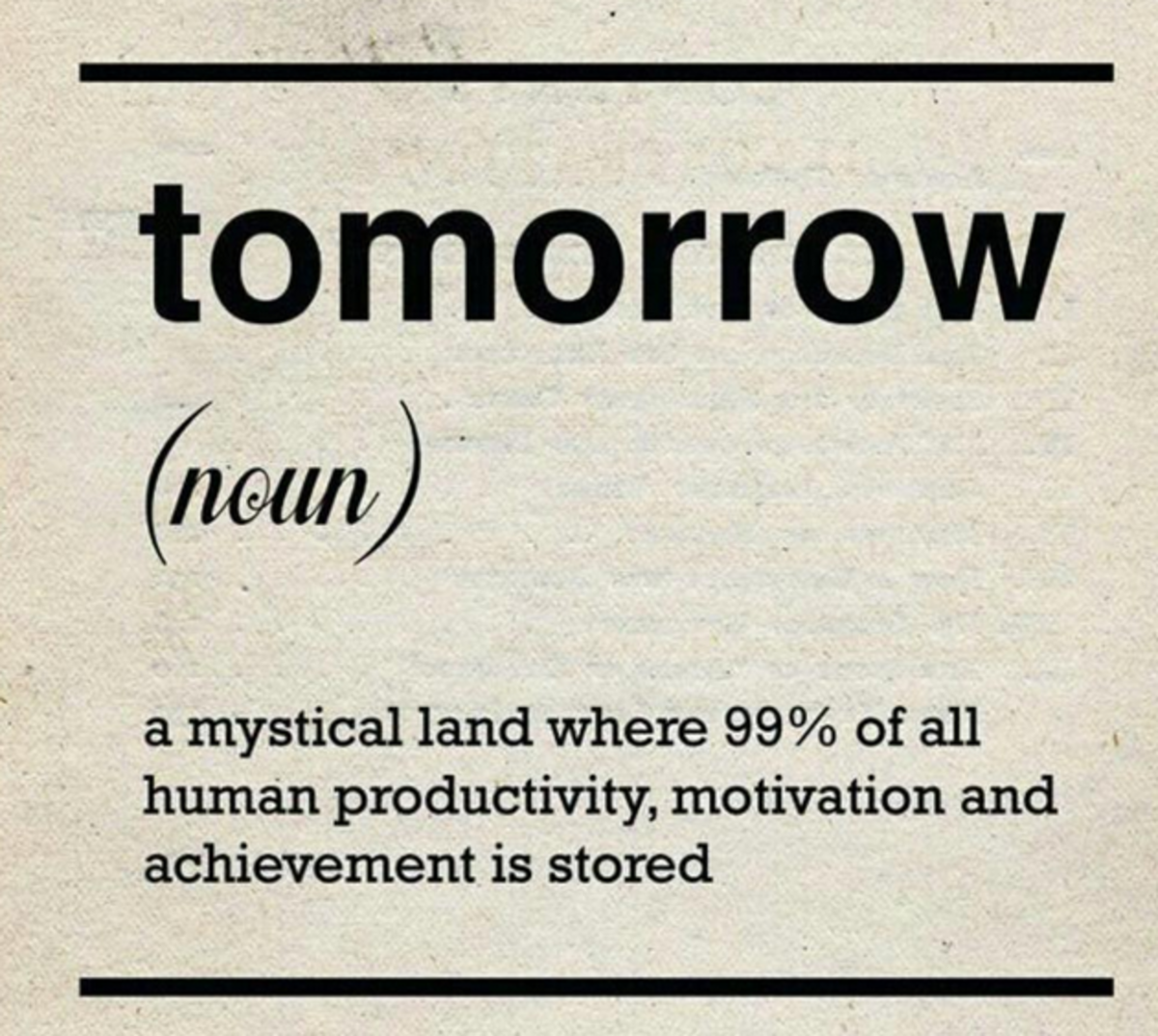Overcome Procrastination and Laziness Now
Procrastination and laziness can really lower your productivity and harm the quality of life.But if you take the advice(which is not hard to follow because i myself do it) in the article,I'm 100% sure you will overcome procrastination.

Don‘t Keep Vague and Elusive Goals
Procrastinators usually put off work because they spend their time setting and resetting their goals. Often they set vague and ambiguous goal like,’’I have got to get some work done today’’ or highly ambitious goals like I used to set,’’I have to write five articles next week,’’(At that time my speed was hardly one article per week).
Such type of goals are harder to accomplish and they actually invite procrastination. I couldn’t write even a single article in the next few weeks.The way I thought about my goal― I was setting myself up for trouble.
Finally, I changed the way I was thinking about my goal. Instead of thinking about having to “write 5 articles in a week’’.I began to say something different to myself,“In the next week, I have to spend two hours every afternoon working on one article.” It was a more reasonable, reachable goal, and it helped me to at least write one article in a week.
Small Steps
The only way to achieve any goal, no matter how large or small, is step by step.
Alan Lakein has presented a very interesting theory in his book How to get control of your time and your life.The theory is that many people put off complex tasks ,because they hope they will find more time for them at a later date.Lakein claims that ,you can start at such complex tasks right away―doing as much of the task as you can in small chunks of time.He compares these chunks of time to holes in Swiss cheese.With enough holes the cheese either disappears― because the job is done―or enough of it disappears,making the job more manageable and easily accomplished.
It Doesn’t Have to Be Perfect.
If you let go of your need for perfection while trying to accomplish a goal,you’ll probably be a lot more successful.you don’t have to spend three hours sweeping the kitchen floor to remove every single speck of dust.One hour is more than enough.Even 30 minutes is enough.
Don’t Wait Until You Feel Like It.
You can start working on your goal even if you are not in ideal mood. If I wait to feel ready and inspired to write an article,I may never write one.
Some thing are so boring that you will never be inspired or feel the desire to attend to them.For instance --- Taxes who looks forward to doing his taxes? psychologists Jane B. Burka and Lenora M. Yuen warn that’’ If you wait until you want to do something, you can wait forever.’’
Dr.David M.D is also of the same view,’’Most procrastinators think that the motivation comes first and action follows. Extremely successful people know that it’s the other way around. Action comes first and motivation follows. They don’t wait around until they ‘feel’ like doing something. They just plow ahead and do it, whether they feel like it or not.’’
Find Your Top Priority Tasks
Make a list of all the tasks that you have to do in a week or day .Apply Pareto Principle.According to this rule 20% of your activities will account for 80% of your results. This means that if you have a list of ten items to do, two of those items will turn out to be worth as much or more than the other eight items put together.Divide your tasks in the top 20% and bottom 80% according to how much importance and long term effect they have on your life.Do only those tasks that are in top 20% and delegate or leave out the rest.
Delegate.
Stephen Covey’s third habit of highly effective people is, “Put first things first.”
As explained before,you should spend your personal time on things that are most important to you and delegate those things that are not your top priority.
Dr. Burka and Dr. Yuen observe that Procrastinators are reluctant to delegate .Here are some reasons that they list in their highly acclaimed book Procrastion:why you do it and what to do about it now ‘’ ..
“I should be able to do it all myself.”
Perhaps in your pursuit of perfection you believe you should never have to ask for help.Stubbornly holding on to every item in your life, results in only half of them getting done.
“I’m the only one who can do this right.”
This is another perfectionistic pitfall. Although there may be some things that you—and only you—can do, is that really true of everything on your list of unfinished chores?
“Delegating is a cop-out.” You may feel too guilty to ask for help.You may feel that you don’t deserve to be helped, so you can’t delegate or rely on others.Refusing help is a good way to procrastinate yourself into martyrdom.
“I might delegate the wrong thing to the wrong person.”
It’s best to delegate to someone who has the ability to help you, who doesn’t hold a grudge against you, and who isn’t a procrastinator or a perfectionist. But if you assume there is one right way to delegate, you will be unable to make a decision while you consider every possible angle, looking for the perfect solution. Anything you pass along will lighten your load, whether it’s mundane or important.’’
If you delegate many of the tasks that now bog you down, you’d have much less standing between you and the really important things that you’ve been avoiding.
Do A One week Experiment
If you are tired of your procrastination and really want to overcome it I suggest you do a one week experiment to See what you can learn about your procrastination as you approach or avoid your goal
For your next one week experiment,choose just one goal. Do not choose vague(I have to get my life more organized) or overly ambitious goals. Choose a behavioral goal.
A behavioral goal is observable, specific, and able to be completed in steps.
“I want to stop procrastinating” is a noble goal, but it is not a behavioral goal. You can’t actually see yourself stop procrastinating. It is not concrete(stop procrastinating on what) It is difficult to break down into steps(how do you start to stop procrastinating?)
“I’ll make an appointment with the dentist’’ is a behavioral goal.Because A camera could see you hanging up the phone after your conversation with the dentist’s office.
List the Steps. Once you have chosen your goal―Break your goal down into its component parts. Each part is one step, a minigoal.
An example of how sally a writer broke her one-week goal(write a 2000 words article) down into small steps is shown below. Each step is to be completed in 2 hours,,Monday through saturday.
- Narrow down the topic and Make a serious and detailed research on the topic(choose a topic beforehand)
- write a rough draft
- rewrite the entire article, add experts opinion and relevant photos.
- proofread and check grammar.
- polish the article to save it from unnecessary words, sentences and paragraphs.Bring the total length to 2000 words.
- Read,Revise and Submit for Publication
Write down your one goal, the steps involved to achieve it, and when during the next week you plan to take each step.Don’t forget to consider other time commitments and obligations you have in the coming week.
Optimize Your Chance to Achieve your Goal.
Even if you have chosen a good behavioral goal and broken it down into steps, where and when you plan to begin can be crucial. The circumstances you set up can either increase or significantly decrease the probability of success. Sally’s first step according to her one week goal of writing the article was researching the topic in a coffee shop nearby from 2p.m to 4 pm.But when she reached the coffee shop with her laptop,she ran into an old friend.Sally was so happy to see her that she started talking and put off doing the research on her laptop till 2.30 then 3 and then gave up.
sally made her first step more difficult by trying to achieve it under less than optimal circumstances.The next day, she revised her plan and decided to research the topic in a campus library. In order to increase her chances of actually getting to the library, she arranged to go with , a studious friend of her.she didn’t change her first step, but she did alter the circumstances to maximize the chances that she would actually take it.
Stick to a Time Limit.
An effective way to make getting started much easier― is to set a limited period of time to work towards your goal and stick to it. Dr. Burka and Dr. Yuen suggest, that you shouldn’t work more than your set limit.For example if you decide to spend one hour working on a project,and you have honored your commitment then you should not continue working well beyond one hour.if you work for two hours the first time,next time you will expect that you should work again for two hours .That’s a set up for discouragement and avoidance.
Reward Yourself After You’ve Made Some Progress.
The idea of giving a reward to yourself may be foreign to you. procrastinators are much more likely to punish themselves than to reward themselves.
For example,Sara,was mad at herself at the end of her one week experiment.She had chosen the goal of cleaning her whole house.She regretted that she had cleaned only the kitchen.She was unable to appreciate the benefits of what she had accomplished.By thoroughly cleaning the kitchen she could at least cook food in a hygienic clean environment. But, as is the case with most procrastinators, it never occurred to sara to feel good about what she had done, because she continued to focus only on what she had not accomplished.
When you do make progress, even if you don’t accomplish as much as you’d ideally like or don’t do it as you had imagined, give yourself some reinforcement. A reward can be anything that you enjoy or that makes you feel good. I usually allow myself some free time,lie on bed and watch a movie.
Rewards work as positive reinforcement, increasing the likelihood that the behavior will be repeated.
Are You Putting off Small Tasks?
Are you putting off small,simple things that would take only a short time to complete?
It’s because leaving little things undone keeps you from giving attention to big things that really need your attention.The little tasks occupy your mind and you don’t have to pay attention to big tasks.This way you deceive yourself that you have more control over your life because you are focused on small tasks that can be done easily.
‘’If you have to let a bunch of little things pile up to give you the illusion that you lead a productive life, maybe deep down you don't feel that your goals are really worth pursuing. So take the time now to examine what your priorities, goals, and values are. For example,do you profess that health is one of your top values, but you get so busy with day-to-day activities that somehow you never find time to go to the gym? Either you need to act more in alignment with your stated value, or you need to admit that health isn't as important as you pretended and put your energy elsewhere. Once you're honest with yourself, you can stop creating the distraction of a mountain of 'undoable' tasks and focus on the goals you really believe in,’’ says Dr.David J. Lieberman an internationally recognized leader in the field of human behavior.
Take a Day Off
Burnout and procrastination are closely related. When you run out of energy, your body procrastinates as a line of defense.work for six days instead of seven. Your capacity to finish work will increase, even though it will be spread over fewer days. By taking a day off, you can recharge the batteries that were drained throughout the week.
If you can't take a day off,allow yourself some hours to relax.
Eat For Energy
I shouldn’t have to tell you what’s in a healthy diet. Low fat, lean meat, more Vegetables and fruits and lots of water.Blood-glucose levels are important for maintaining energy. A high GI food keeps you energetic only for a short period of time and after that you will feel drained and unable to do work. Lower GI foods releases sugar more slowly and cause a more gradual increase in blood sugar.. blood sugar levels stay more stable for longer periods, at a more moderate level and you can carry out your tasks without feeling drained.








